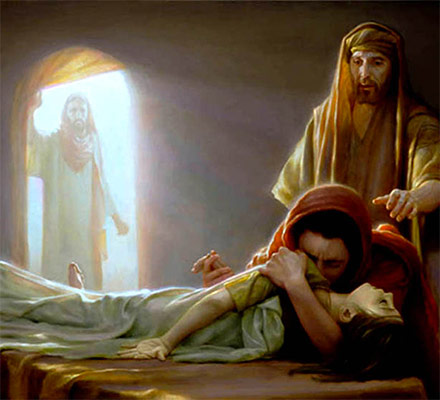Today’s readings remind us that if the Gospel is really good news to us we should share it.
In today’s First Reading Job is in desperate need for some good news after being so afflicted. He’s lost property, family, and health. Life has become pure drudgery for him with the rest or reward that should follow still far from sight. How many of us mid-week have a similar attitude? It seems the next break, the next paycheck is too long in coming in the face of the daily grind. Yet we have to admit that when that lunch break or paycheck comes it doesn’t satisfy us for very long, and we go right back to the drudgery. In a hopeless life there’s little good news to share. Yet even Job knows his redeemer lives. Life is not entirely hopeless.
In today’s Second Reading Paul reminds us that the Gospel is good news that is meant to be shared. He lived in a world of Job’s, and so do we. People need something to lift them up from their drudgery. Spreading the good news for Paul is not just something he wants to do, but something he felt obliged to do. There’s no catch. He’s not trying to sell anything. He’ll do whatever it takes to make sure the Gospel is received as good news. Paul’s example teaches us that if we don’t share the good news it could be because for us it is not good news. If it’s not good news for us, then what is it?
In today’s Gospel we see the first moments of Our Lord’s earthly ministry continuing to take shape. After an impressive demonstration of authority and power in the synagogue, he comes to Simon Peter’s house and heals his mother-in-law. Soon people are coming from all over the village, bringing the sick and those afflicted by demons so that Our Lord can heal them and liberate them from evil.Despite this success, he knows he can’t just stay in one village, but bring his teaching and power everywhere.
Good News spreads fast. Today we live in a society where the Good News has been spread far and wide, yet people don’t come to Our Lord for healing and liberation from the evil afflicting their lives. Why? We have a duty to spread the Good News, but that’s not just quoting the bible chapter and verse, but by giving testimony to the impact Our Lord has had on our own lives. Those crowds in the Gospel today would not have heard anything if Our Lord had not taught, healed, or exorcised someone they knew.
It’s very easy to gossip, and gossip these days is usually corrosive, not constructive. Sometimes people giving up cigarettes take up sucking on a lollipop instead. Everyone knows gossip is wrong, but quitting cold turkey can be especially hard. Make a resolution to swap out that gossip with good news instead. Spread some hope and encouragement instead of negativity and cynicism.
Readings: Job 7:1–4, 6–7; Psalm 147:1–6; 1 Corinthians 9:16–19, 22–23; Mark 1:29–39.


